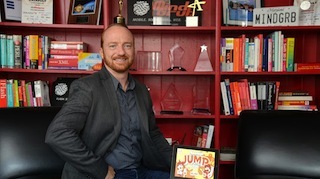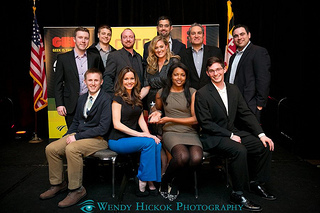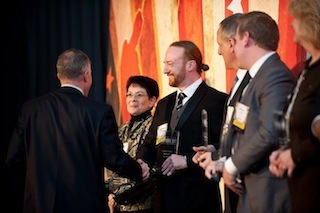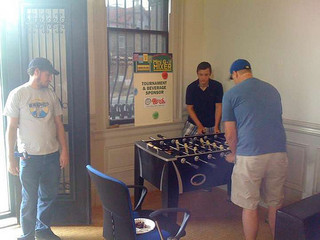Todd Marks, founder of Mindgrub, shares how he has competed with top firms through stellar employee selection, innovative business tactics, and a serious work ethic.
Mindgrub is not unlike a digital ad agency; they develop websites, marketing campaigns and interactive media--but their main efforts lie in engineering mobile and interactive web apps, integrating social media, and gaming. After many long years, this Baltimore-based company has become a market leader in the tech space through its mastery of converting client's creative ideas into realized software. Todd shared with me his successes, as well as his many moments broke, hungry, and on the cusp of failure.
Steve Mariotti: So what does Mindgrub do?
Todd Marks: Mindgrub is a technology innovation agency that produces mobile, social and web applications. We specialize in the design and development of mobile, social and web applications for corporations, government, education, and philanthropic organizations. Mindgrub implements everything from mobile gaming and interactive websites, to enterprise information systems, location-based services and augmented reality applications.
SM: What makes your company unique?
TM: We are an innovation company. And we are a word-of-mouth company--people hear that we take on the hairy projects, and that drives business. We also have two ancillary companies:
- Mindgrub Games --A subsidiary of Mindgrub. It's a business unit of Mindgrub, where Mindgrub software is used in gaming.
- viaPlace--We manage outdoor points of interest. We map buildings, for example, college campuses, and allow students to do walking tours with our app.
We are really cross-industry. We work with CEOs of well-funded startups and the software we write for them is usually the product that goes to market. We work with the chief marketing officers because they want brand awareness or want to sell direct consumer products as part of a marketing campaign. We also work with CTOs and CIOs that are looking to provide a utility app for a salesperson, an end user, or support team.
Mindgrub produces Mobile, Social and Web Applications
SM: What is your economics of one unit?
TM: We do fixed price and time, and materials software development. We also have direct-to-consumer games and license our location-based services product, viaPlace.
SM: What are tips for young people following the same path?
TM: First of all, at the beginning, you need that competitive advantage. Ours was delivering the same or better quality than our competition on really challenging software projects, but at a lower cost. We were able to do this because we headquartered in Baltimore, where the costs of living are significantly lower than our competition in New York City.
2. You also have to treat your talent well, as they are the reason your company will grow. A lot of my interns--who started in my basement--have taken over different sectors of the company. My first interns now run my Web division and head up our mobile practice.
3. You need to be hungry to get through the highs and lows of being an entrepreneur. A lot of people know all about business models, and venture capital--but you're not going to succeed without being hungry during times when you can't make payroll, or when you are just trying to get that first big client.
4. Be conscious of what motivates you, and stay focused on pushing forward. There are several studies showing that entrepreneurs need the manic and depressive feelings associated with conducting your own business. It describes how many constantly push to satisfy those needs. I know I am attracted to the ups and downs, but I feed that need through innovation. Whenever we're slow, and everything is going right, I get down--calm waters make me crazy. So, I look for inefficiency. We're constantly innovating because we are constantly achieving our goals--I still get to put out fires without anything ever going down for the business.
Md. Technology Company of the Year
SM: How has hunger to succeed defined your experience as an entrepreneur?
TM: Mindgrub is really rocking it now, but it hasn't always been easy. We started during the thick of the recession and really struggled to get paid by clients in '09. There were several times that year I could barely make payroll. I closed out my savings and stocks, maxed out my credit cards, and ended up borrowing money from my family to make two payrolls.
I remember one of the worst days. I had spent the better part of two days dialing for dollars and was coming up short to pay my employees one Friday. I looked over to see the old minivan that belonged to one of my closest employees. It struck me that he probably had saved up the money I needed to get everyone paid. So I pleaded with him to borrow the money.
After our conversation, I went back into the office and apologized for holding everyone up, claiming that I was closing a big deal outside. I cut everyone checks and pulled a few people aside to ask them to deposit their checks late the next day. The other employees went straight to the bank, not knowing how close things were.
Its amazing to think my payroll for one month now exceeds what it was for the entire year back then. But problem solving to get everyone paid that week was one of the most difficult challenges I have faced.
I can't help but think back to my summers at a canoeing camp in Canada when I had to keep paddling past midnight in stormy weather to get to safety. Those lessons in perseverance set me up to face the challenges I would later meet running a small business. If you can take an easy out you will, but if you have to keep pushing on to get to safety, eat your next meal, or keep the roof over your head, that is a big motivator that will keep you going during the lean years.
SM: How did you recruit the right people for Mindgrub?
TM: We are a lifestyle, culture-based business. We skateboard between our offices, have catered lunches, and all wear shorts and sandals. We are really looking for employees that are going to be a part of this family.
They are largely optimistic, entrepreneurial critical thinkers and creatives who ultimately fit in with our culture and lifestyle. We need to find both exceptionally bright and talented designers and developers, but also ones that are a great culture fit who will be a part of our extended family.
Now, we have a recruiter, but at the beginning, I was a guy in a basement competing with $25 to $30 an hour offers, just for part-time student interns. I lined up computer science majors for interviews. I had them pick RockBand or or Wii Golf and their interview was to play either with me for an hour. With Rock Band, if they could jam out on Expert, I knew they were bright. For Wii Golf, I could see how much they improved over the 18 holes to see how well they could pick up new skills and make for a good engineer at our technology innovation agency.
SM: Where do you see Mindgrub going in the future?
TM: As an entrepreneur, you need to know where the next paradigm shifts are going to happen, where the disruption is and what is going to be technologically innovative in the marketplace (see more on disruption and the entrepreneur here).
We are constantly in our Mindgrub labs group doing R&D with writing software that we think it going to capitalize on the next hardware paradigm shift. When it happens, we are there, ready to provide that service to our clients and blow it out.
The next big hardware shift is going to be moving from smartphones to more wearable computing, The Internet of Things, and Connected Cars. It could be in your car dashboard or car display or more like Google Glass, where you are wearing a heads-up-display in front of your eyes. There will also be more utilization in speech recognition and working with companies like Nuance.
Special thanks to Maya Horgan and Lauren Bailey for their assistance on this article.





